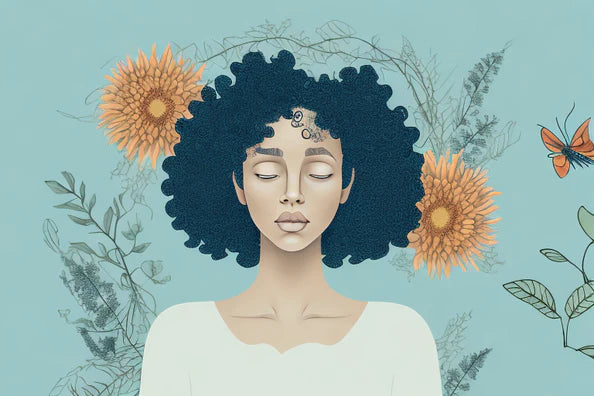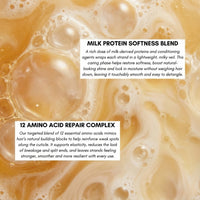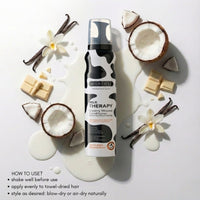Understanding and Managing Dry Hair: A Comprehensive Guide
Posted by MORFOSE COSMETICS

Dry hair can be a persistent woe, leaving your locks looking dull, frizzy, and brittle. In this comprehensive guide, we'll delve into the world of dry hair, uncovering its causes, effects, and practical solutions to keep your mane lustrous and healthy.
What Is Dry Hair?
Dry hair is a condition that occurs when your hair lacks sufficient moisture or is unable to retain it. The outer layer of your hair is covered in natural oils, which not only provide a healthy sheen but also allow your hair to reflect light, giving it that attractive glow. So, when these natural oils diminish, your hair can appear lackluster and lifeless.
Common Causes of Dry Hair
- Scalp: Your scalp's natural oils are the primary source of moisture for your hair. When your scalp becomes dry, your hair follows suit. Itchiness and dandruff are telltale signs of a dry scalp.
- Aging: As you grow older, your hair's ability to produce oil decreases, leading to drier hair. Hormonal changes, particularly after menopause, can exacerbate this.
- Environmental Factors: Prolonged exposure to dry, sunny, and windy weather can strip your hair of its natural oils.
- Chlorinated or Salty Water: Frequent swimming in chlorinated or salty water can lead to dry hair due to the chemical reactions that occur with your hair's natural oils.
- Poor Hair Care Practices: Several hair care habits can contribute to dryness, including excessive washing, using harsh conditioners and styling products, frequent blow-drying, using chemical hair treatments and dyes, and overusing electric straighteners and curlers.
- Underlying Health Conditions: Your hair's health is closely tied to your overall well-being. Health challenges and nutritional deficiencies can significantly impact your hair. Conditions such as anorexia nervosa, hypoparathyroidism, and hypothyroidism can lead to dry and brittle hair.
Effective Remedies for Dry Hair
Now that you understand what causes dry hair, let's explore practical remedies to restore your hair's natural luster:
- Moisturizing Conditioners: Use a moisturizing conditioner to replenish lost moisture. Deep condition your hair 2-4 times a month for best results.
- Choose Hair Care Products Wisely: Opt for hair care products tailored to your hair type, considering factors like porosity (low, medium, or high). Determine your hair's porosity before making product choices.
- Reduce Shampoo Frequency: Shampoo your hair less often, ideally once or twice a week. This prevents overstripping your hair of natural oils.
- Limit Heat and Chemical Treatments: Avoid excessive heat and chemical treatments. These practices can exacerbate dryness and damage to your hair.
- Protection from Sun Exposure: Shield your hair from prolonged exposure to intense sunlight, which can dry out your hair and deplete its moisture.
- Supplements: Consider vitamin supplements to support hair health from the inside out.
- Natural Hair Oils: Apply natural oils such as Rice Bran Oil, Onion Oil, and Super Seed Regrowth Oil to supplement your scalp's natural oils. These oils can help repair brittle hair, promote scalp and hair health, stimulate hair growth, and prevent premature graying.
Onion Oil for Dry Hair
Onion oil is a potent treatment for dry hair. To prepare homemade onion oil, extract juice from onion slices without adding any chemicals. The juice itself serves as the oil. Here's how to apply onion oil:
- Mix onion oil with coconut oil.
- Warm the mixture and generously massage it into your scalp and hair length.
- Leave the oil on overnight.
- Rinse it the next morning with a mild shampoo.
Onion oil conditions, moisturizes, strengthens hair, prevents breakage, and promotes hair growth.
How Often to Oil Your Scalp
If you have healthy hair, oiling once or twice a week is sufficient. However, for those with dry hair, daily or every other day for a week may be beneficial. Afterward, reduce the frequency to once or twice a week.
Moisturizing Natural Hair
For effective moisturizing, consider the following best practices:
- Use a True Moisturizer: Choose a product with water listed as its first or second ingredient.
- Sealing with Natural Oils: Seal in moisture with natural oils such as Shea butter, onion oil, or avocado oil. Leave the oil on for 20-40 minutes before shampooing.
- Heat and Porosity: Adjust your moisturizing routine based on your hair's porosity. Low porosity hair benefits from more frequent moisturizing and longer sealant application, while high porosity hair requires less frequent moisturizing.
- Cherry Lola Treatment: Consider the "Cherry Lola Treatment" with yogurt, liquid protein, and baking soda. Use this treatment no more than twice a month, as excessive amino acids may not be suitable for your hair.
In conclusion, understanding the causes of dry hair is the first step towards healthier, more vibrant locks. By adopting proper hair care practices and incorporating natural remedies like onion oil and appropriate moisturizing techniques, you can say goodbye to dry, lackluster hair. Embrace these solutions to enjoy the long, healthy hair that never fails to turn heads.

Are you tired of looking in the mirror and seeing dull, frizzy, and brittle hair? Dry hair can be a persistent concern, affecting people of all ages. In this comprehensive guide, we will embark on a journey to explore the world of dry hair, delving into its root causes, the effects it has on your mane, and practical solutions to help you maintain a head of hair that radiates health and vitality.
What Exactly Is Dry Hair?
Dry hair is a condition that occurs when your hair is deprived of adequate moisture or struggles to retain it. Your hair consists of three layers, with the outermost layer boasting natural oils that provide a glossy sheen. These oils not only give your hair a healthy appearance but also allow it to reflect light, resulting in an attractive and vibrant look. When these natural oils become scarce, your hair loses its luster and appears lifeless.
Unraveling the Causes of Dry Hair
- Dry Scalp: Your scalp's natural oils are the primary source of moisture for your hair. When your scalp becomes dry, your hair tends to follow suit. Itchiness and the presence of dandruff are common indicators of a dry scalp.
- Aging: As you grow older, your hair's ability to produce oil diminishes, leading to drier hair. Hormonal changes, particularly after menopause, can further exacerbate this condition.
- Environmental Factors: Prolonged exposure to dry, sunny, and windy weather can deplete your hair of its natural oils.
- Chlorinated or Salty Water: Frequent swimming in chlorinated or salty water can contribute to dry hair due to chemical interactions that affect your hair's natural oils.
- Poor Hair Care Practices: Several common hair care habits can contribute to dryness. These include excessive washing, the use of harsh conditioners and styling products, frequent blow-drying, reliance on chemical hair treatments and dyes, and the overuse of electric straighteners and curling irons.
- Underlying Health Conditions: Your hair's health is intertwined with your overall well-being. Health challenges and nutritional deficiencies can significantly impact your hair. Conditions such as anorexia nervosa, hypoparathyroidism, and hypothyroidism can result in dry and brittle hair.
Effective Remedies for Dry Hair
Now that we've unraveled the factors causing dry hair, let's delve into practical remedies to rejuvenate your hair's natural luster:
- Moisturizing Conditioners: Utilize a moisturizing conditioner to replenish lost moisture. For optimal results, incorporate deep conditioning into your routine 2-4 times a month.
- Wise Product Selection: Choose hair care products specifically tailored to your hair type. Consider factors such as hair porosity (low, medium, or high) before making your product selections.
- Moderate Shampoo Usage: Reduce the frequency of shampooing your hair, aiming for once or twice a week. This practice helps prevent the over-stripping of natural oils from your hair.
- Minimize Heat and Chemical Treatments: Steer clear of excessive heat and chemical treatments, as they can intensify dryness and damage to your hair.
- Sun Protection: Safeguard your hair from prolonged exposure to intense sunlight, which can lead to excessive dryness and moisture depletion.
- Supplement Support: Consider vitamin supplements to boost hair health from within.
- Natural Hair Oils: Embrace the application of natural oils, such as Rice Bran Oil, Onion Oil, and Super Seed Regrowth Oil, to replenish your scalp's natural oils. These oils can effectively repair brittle hair, promote scalp and hair health, stimulate hair growth, and even stave off premature graying.
Harnessing the Power of Onion Oil for Dry Hair
Onion oil emerges as a potent remedy for dry hair. Crafting homemade onion oil is simple – extract juice from onion slices without any chemical additives. Here's how to apply onion oil effectively:
- Oil Mixture: Blend onion oil with coconut oil.
- Application: Warm the mixture and generously massage it into your scalp and hair length.
- Overnight Treatment: Leave the oil on overnight.
- Rinse: The following morning, rinse thoroughly using a mild shampoo.
Onion oil brings a multitude of benefits to your hair, including conditioning, moisturizing, strengthening, breakage prevention, and hair growth promotion.
Establishing a Scalp Oil Routine
If you have healthy hair, oiling your scalp once or twice a week is generally sufficient. However, for individuals grappling with dry hair, adopting a daily or every-other-day routine for a week can prove beneficial. Following this intensive phase, it's advisable to revert to an oiling frequency of once or twice a week.
Mastering the Art of Natural Hair Moisturization
For effective hair moisturization, consider the following best practices:
- Select a True Moisturizer: Choose products where water is listed as the first or second ingredient.
- Sealing with Natural Oils: Lock in moisture by using natural oils such as Shea butter, onion oil, or avocado oil. Allow the oil to sit for 20-40 minutes before shampooing.
- Tailored Approach for Different Porosities: Adjust your moisturizing regimen based on your hair's porosity. For hair with low porosity, frequent moisturizing and longer sealant application are beneficial. High porosity hair, on the other hand, requires less frequent moisturizing.
- Cherry Lola Treatment: Consider incorporating the "Cherry Lola Treatment" with a blend of yogurt, liquid protein, and baking soda. However, it's essential to exercise caution and not exceed this treatment more than twice a month, as excessive amino acids may not be suitable for your hair.
In conclusion, comprehending the root causes of dry hair is the first step towards achieving healthier and more vibrant locks. By implementing proper hair care practices and integrating natural remedies like onion oil and meticulous moisturization techniques, you can bid farewell to dry and lifeless hair. Embrace these solutions, and embark on a journey towards achieving the long, radiant hair that never ceases to captivate attention and turn heads.



